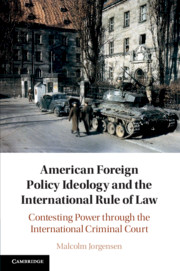 American Foreign Policy Ideology and the International Rule of Law
American Foreign Policy Ideology and the International Rule of Law from Part II - Contesting Global Legal Power through the ICC
Published online by Cambridge University Press: 12 December 2019
The Conclusion considers implications of these findings in the era of President Donald Trump and beyond, which so far exhibits clear continuity with the ideological structure of its predecessors. The case of the ICC provides compelling evidence that foreign policy ideology structures distinct conceptions of the international rule of law amongst American legal policymakers and that these received principles set hard limits to reaching a universal understanding of the proper design and development of the international legal order. Defining the international rule of law remains a dialectical process in which ideological visions of global order contest power through the shared space of the international legal system. Continued commitment to this contest is evidence, nevertheless, of the consequence of IL as a framework for sustaining discourse about global power and transcendent values.
To save this book to your Kindle, first ensure [email protected] is added to your Approved Personal Document E-mail List under your Personal Document Settings on the Manage Your Content and Devices page of your Amazon account. Then enter the ‘name’ part of your Kindle email address below. Find out more about saving to your Kindle.
Note you can select to save to either the @free.kindle.com or @kindle.com variations. ‘@free.kindle.com’ emails are free but can only be saved to your device when it is connected to wi-fi. ‘@kindle.com’ emails can be delivered even when you are not connected to wi-fi, but note that service fees apply.
Find out more about the Kindle Personal Document Service.
To save content items to your account, please confirm that you agree to abide by our usage policies. If this is the first time you use this feature, you will be asked to authorise Cambridge Core to connect with your account. Find out more about saving content to Dropbox.
To save content items to your account, please confirm that you agree to abide by our usage policies. If this is the first time you use this feature, you will be asked to authorise Cambridge Core to connect with your account. Find out more about saving content to Google Drive.